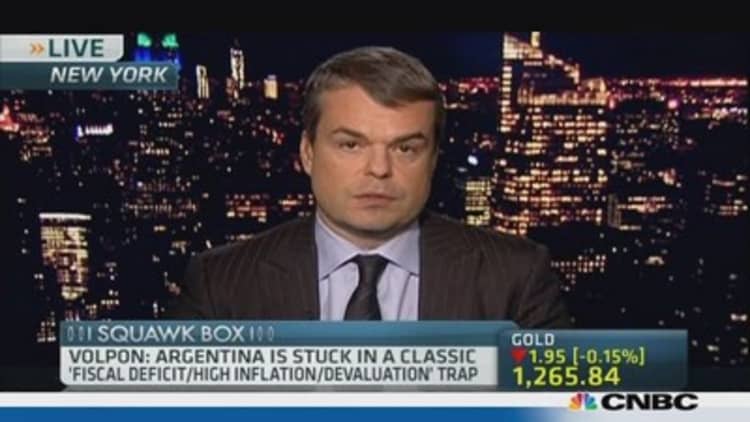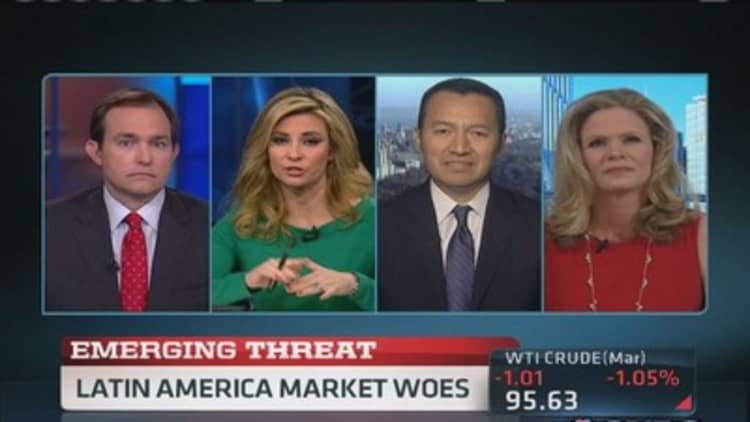
Argentina's latest monetary ailment may prove contagious for some of its Latin American neighbors, with Brazil likely to be the first to catch the fever.
"What has been happening in Argentina will have a negative impact on the Brazilian economy," Tony Volpon, a strategist for Latin America at Nomura, told CNBC, citing long-standing trade ties. "For example, about 70-80 percent of Brazilian car exports actually go to Argentina. So they are vulnerable."
Argentina surprised the market last week by suddenly relaxing its currency controls, which have been blamed, at least in part, for spurring high inflation and a sharp drop in its currency by sparking black market demand for dollars. The country's peso is down more than 20 percent against the U.S. dollar since the start of the year. Many analysts view the country's policy response as worsening the crisis.
(Read more: Why you don't need to cry over Argentina)
"We're in a classical kind of devaluation scenario," Volpon said. "They devalued the peso to eight (against the U.S. dollar). Now, they're trying to hold it at that level through intervention. Pretty soon there'll be a lot of pressure and they'll have to devalue again. That'll feed back into inflation and it just becomes a spiral," he added.
"For political reasons, the government is really unwilling to make the necessary choices to anchor the currency," he said.
(Read more: Emerging market rout 'a long time coming': Rhodes)
Brazil's real has also taken a hit in the wake of a general fund outflow from emerging markets, falling around 2.0 percent against the dollar since the start of the year. Its central bank raised rates by 50 basis points in mid-January to 10.5 percent. But other policy responses have been constrained.
"There are presidential elections (coming up) in Brazil," noted Volpon. "That's one of the reasons Brazilian authorities haven't moved as quickly as they need to, especially in terms of fiscal policy, to address some of the pressures coming from markets." The country's presidential election is set for October.
"Elections always constrain what politicians are willing to do in terms of the hard choices you have to make in these moments," he said.
(Read more: Could this currency sell off like Argentina's peso?)

To be sure, not all of Brazil's woes can be laid at Argentina's door.
"There have been a number of warning signs that Brazil's economy has been enjoying a credit boom disproportionate to the amount of savings in the economy," Jefferies said in a report. "Domestically, Brazil has overheated and its exchange rate is too uncompetitive for the economy to benefit from an upswing in global growth," it said.
While there are concerns Argentina's woes may prove contagious, many believe the impact will be limited.
"Argentina is not even classified as an emerging market yet and is largely inaccessible to global investors," Wells Fargo said in a note. "The realities to which Argentina succumbed are not broadly representative of the rest of the emerging markets," it added.
(Read more: Emerging markets ETFs: Which to buy, which to avoid)
Volpon also doesn't expect Argentina's woes to spread too much further within the continent.
"The countries that have the more market friendly policy stances have done better," he said. "It's not that they haven't felt the pressure because this is a shock affecting all of the continent, but they have done a lot better."
He noted the Pacific-facing countries – Chile, Colombia and Peru as well as Mexico – have solid policies.
—By CNBC.Com's Leslie Shaffer; Follow her on Twitter @LeslieShaffer1

